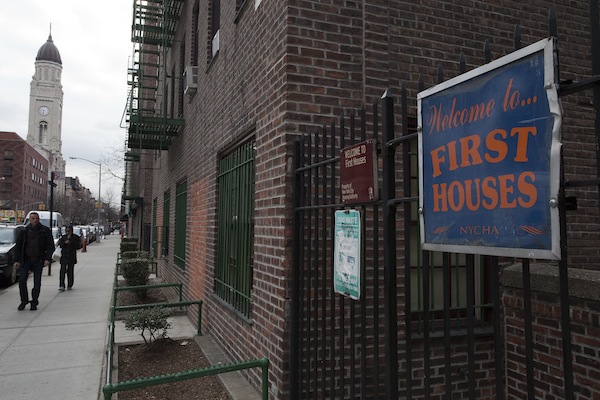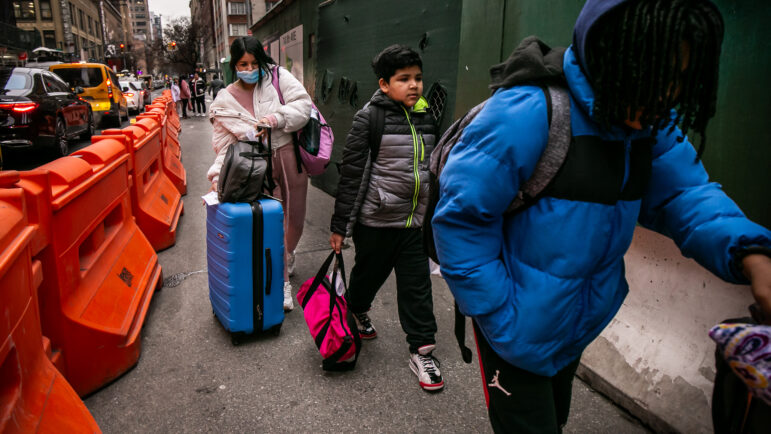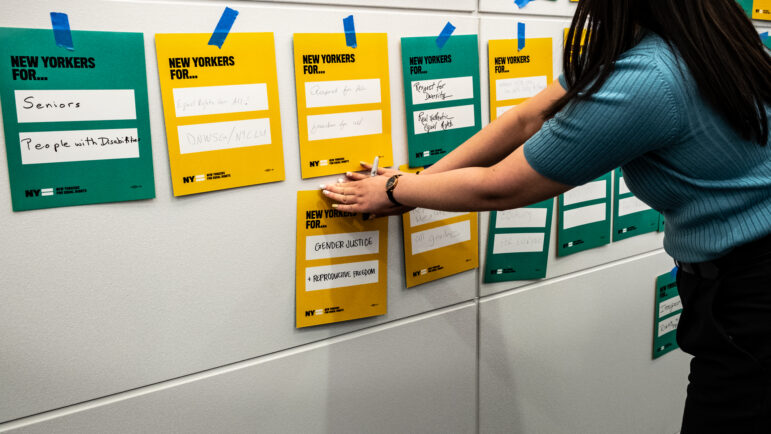
J. Murphy
First Houses, on the Lower East Side, is where public housing began in the United States.
Newspaper headlines questioning the management of the New York City Housing Authority (NYCHA) and the maintenance of the agency’s 334 developments have been all too common lately. From hazardous conditions to questionable budgeting, it is clear that the agency’s long history of unresponsiveness has yet to improve under the de Blasio administration.
The mayor came to office with assurances he would fix the broken agency, and hasten the repair of dangerous conditions that have long plagued so many NYCHA apartments. He blasted the “fundamental problem of management” at NYCHA and vowed to turn the agency around if elected.
However, one year later, little seems to have changed, and NYCHA’s record of responsiveness is not discernibly better than it was under previous administrations.
A lawsuit filed by the Safety Net Project of the Urban Justice Center on behalf of 36 residents of Hope Gardens/Bushwick Houses details the hazardous and health-threatening conditions in NYCHA apartments that have been disregarded for months, and in some cases, years.
Chronic sewage flooding has forced one of the plaintiffs to leave work early and rush home, move furniture and mop up the raw sewage that has polluted and poisoned her apartment. After cleaning her floors of urine, feces and used toilet paper, she must then disinfect and bleach her entire home.
Other NYCHA residents are forced to endure recurring toxic black mold, including one of the plaintiffs who lives with her four minor children, all of whom suffer from asthma and other respiratory conditions. The Centers for Diseases Control warns that exposure to mold can cause wheezing and skin irritation, as well as more severe reactions, such as fever and shortness of breath. People with compromised immune systems or pulmonary issues are at increased risk for infections in their lungs.
A third plaintiff has long endured brown tap water from her sink, unsuitable for cooking, washing or even brushing her teeth.
Recently, when temperatures have dropped to a near zero degrees, residents of Hope Gardens had little heat and had to rely on dangerous space heaters and ovens to keep warm. Despite a lawsuit, resident complaints, and press stories, NYCHA has yet to fix the heating problems.
Dangerous conditions exist in scores of other NYCHA apartments, as well as in shared common areas, where they serve as an accomplice to the violent crimes plaguing many NYCHA developments.
NYCHA residents have complained of inadequate or inoperable safety locks to protect tenants from trespassers. Damaged safety cameras, broken lighting and out-of-order elevators all assist violent criminals as they stalk victims in NYCHA buildings. Crime, as we know, has skyrocketed in NYCHA developments and the city has assigned more police officers to protect residents. Perhaps a less expensive solution – or at least a partial solution – would be to fix all the safety-related problems in the developments.
NYCHA residents deserve all the rights and protections offered other tenants in New York City. They deserve timely repairs of hazardous conditions, and if those repairs cannot be made within a reasonable time frame, NYCHA should provide rental abatements.
NYCHA residents should be able to call the 311 Citizens Service Center with complaints about repairs – just as their fellow New Yorkers can. This would enable them to receive independent follow-up enforcement services. NYCHA should also act immediately to repair public areas and remove the hazards that set the perfect stage for criminal activity – including broken elevators, non-working intercoms, faulty lighting and inadequate security measures.
We remain hopeful that Mayor de Blasio will fulfill his campaign promises and address the many problems effecting NYCHA and destroying the quality of life of its residents. It was only after commencing litigation that NYCHA agreed to abate the myriad of violations that were found throughout the development. NYCHA must begin to fulfill its responsibilities and duties as a landlord without the threat of a court order. Until then, we will continue to pursue legal means to secure and protect the rights of NYCHA residents.








